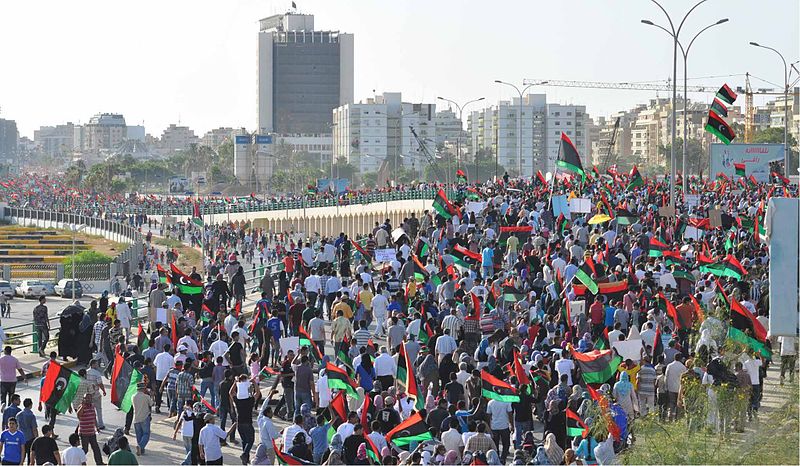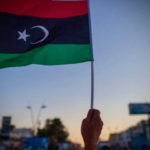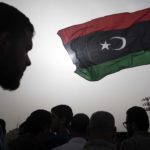Libya : The Platform Coalition : An update on the situation of Human Rights
The Platform Coalition seeks to shed light on the most egregious human rights violations in Libya by periodically updating them to monitor the violations, press the various Libyan authorities to stop them, and emphasize ways to support human rights and restore the rule of law.
First issue: The prevalence of extrajudicial killings and enforced disappearances in Libya as a means of extending the influence of armed groups of the conflicting parties
Extrajudicial killing and enforced disappearance remain rampant in Libya, given the lack of political by the official and de facto authorities to end such practices and prevent their units from using them as a means to gain political leverage. In fact, all parties to the conflict continue to perpetrate such crimes as a systematic means of tightening their grip over a particular geographic territory or closing down the public sphere and obstructing the work of politicians and civil society activists.
The platform reminds all parties of their obligations under international humanitarian law. Article 8 (2) (c) of the Rome Statute of the International Court of Justice states: In the case of an armed conflict not of an international character, serious violations of article 3 common to the four Geneva Conventions of 12 August 1949, namely, any of the following acts committed against persons taking no active part in the hostilities, including members of armed forces who have aid down their arms and those placed hors de combat by sickness, wounds, detention or any other cause: (i) Violence to life and person, in particular murder of all kinds, mutilation, cruel treatment and torture; (ii) Committing outrages upon personal dignity, in particular humiliating and degrading treatment; (iii) Taking of hostages; (iv) The passing of sentences and the carrying out of executions without previous judgement
pronounced by a regularly constituted court, affording all judicial guarantees which are generally recognized as indispensable.
Enforced disappearance as a means of silencing and striking political opposition
Abductions, arbitrary detentions and enforced disappearances, targets of which include activists and journalists, have increased since April 2019. Dr. Ali al-Sayd Mansour, the secretary of the Libyan National Assembly in Tripoli[2], was arrested by a militia on 20 July 2019, after he called on the assembly to stop the war and resume dialogue and to unify the military establishment. He is being held under dubious charges of supporting the Operation Dignity forces. Two days earlier, after appearing in a televised interview during which she gave her opinion on Libya’s political conflict, Dr. Siham Sarqiwa, a member of the House of Representatives in Benghazi, was arrested and forcibly disappeared after her home was stormed and family assaulted.
Civilians in Libya, including politicians and journalists, continue to be abducted, detained and disappeared amid the authorities’ failure to take any practical steps to stop these practices. Activist Abd al-Muizz Banoun remains missing after his abduction by an unknown militia on 25 July 2014 in Tripoli, as is activist Abd al-Mutallab al-Sarhani, who was kidnapped in August 2017 in Benghazi, along with many others.
Extrajudicial killings are a tool to eliminate detainees without trial
Extrajudicial executions have become alarmingly frequent throughout Libya, and are perpetrated by all parties to the conflict. On 18 July, five people were found dead in the Hawari area of Benghazi[3]; they had been shot and their bodies showed signs of torture. They were found near the bombing site of the city cemetery, recalling the mass revenge killings that followed the bombing of the Bayat al-Radwan Mosque in Benghazi in January 2018. The Libya Platform also recalls the killing of a group of prisoners on 29 June in a hospital in al-Ghariyan, located west of the capital. The Presidential Council of the Government of National Accord (GNA) has thus far opened no investigation into the killing, even after its troops retook the city.
These mass extrajudicial executions occur alongside countless other killings committed with impunity by all parties to the conflict over the last three years, absent any tangible action to bring perpetrators to account. These include the extrajudicial murders of 36 people, found shot in the head on 27 October 2018 on the al-Abyar Road, 70 km from Benghazi, which is under the control of militias subordinate to Field Marshal Khalifa Haftar, the head of the Libyan National Army in the eastern part of the country. In addition, three bodies were found dumped in front of Al-Huraish Hospital in the city of Derna and were liquidated by the Shura Council of Mujahideen in Derna and its environs.
There are also allegations of the torture and execution of dozens of prisoners during an attack by forces under command of the Presidential Council of the GNA on the Tamenhant airbase at Brak al-Shati[4], in southwest Libya, on 17 May 2017. In addition, the bodies of 12 prisoners were found on June 2016 in Tripoli, despite court orders for their release and evidence that they were indeed released from al-Ruweima Prison.
Armed groups systematically violate the principles of international humanitarian law
In the context of the escalation of ongoing armed confrontations in Tripoli starting last April, the city of Murzuq in southwestern Libya was air bombed on August 5, which resulted in a number of civilian deaths. Mitiga airport was bombed in Tripoli on August 4, 2019, which resulted in the temporary closure of the airport.
On July 29, 2019, El Alamein School in Al-Hani area and Al-Zawiya Field Hospital in the Airport Road area south of Tripoli were targeted by aerial bombardment, depriving thousands of people of their basic right to health. According to the UN Office for Humanitarian Affairs: “Four doctors and a paramedic were killed and eight medical staff were injured in the attack on the field hospital. Since the beginning of the conflict in Tripoli in April, there have been 37 attacks on health workers in Tripoli, killing 11 people and injuring 33, and 19 ambulances have been directly or indirectly affected”.
As armed fighting escalated in Tripoli starting in April of this year, a June 27th report of the World Health Organization stated that the exchange of gunfire in the capital had resulted in 4,407 injured and 739 dead, 137 and 41 of whom were civilians, respectively; including an ambulance driver and two doctors. The report added that thousands of people had fled their homes, while civilians remained trapped in their homes in combat areas.
According to the UN Office for the Coordination of Humanitarian Affairs, there have been 178 civilian casualties, including 41 killed, in addition to 105,000 internally displaced people. Another 3,800 refugees and migrants held in detention centers in Qasr bin Ghashir, Ghariyan, and Ain Zara are in immediate danger from the conflict; thus far44 of them have been killed in the bombing of the migrant detention centers in July 2019 in the suburbs of Tajoura, located about 8 km from the capital. Forces under the control of the Presidential Council, subordinate to the Government of National Accord, allegedly carried out the bombing.
The platform states that the ongoing armed clashes and endangering the lives of citizens during April 2019 are not a separate incident.On January 16, 2019, there were also serious violations during the renewed fighting in Tripoli between the armed groups, leaving dozens of dead and injured. This came one day after the commander of the armed forces appointed by the House of Representatives in eastern Libya announced a military operation in southwestern Libya and his strong entry into the cities of southern Libya, has documented cases of attacks on civilians and reprisals[5]. He also announced the end of military operations in Derna after fierce battles with the Derna Shura Council (Protection Force Derna) after the siege of the entire city[6].
Libyan judicial authorities throughout the country continue to prove incapable of ensuring legal accountability for violations of human rights and international humanitarian law. Moreover, judicial authorities, especially prosecutors, face extraordinary difficulties and challenges, most significantly in the security realm.
Recommendations
Given the security vacuum and the lack of militia regulation, the Libya Platform calls on all official and de facto authorities to compel their forces to immediately stop committing extrajudicial killings, release all persons disappeared, and ensure that all detainees enjoy their basic rights, including the right to be detained in a disclosed location and to contact their family, lawyers, and specialized doctors, as guaranteed by international human rights law and international humanitarian law. We also urge the official and de facto authorities to bring all persons suspected of involvement in grave human rights abuses and miscarriages of justice.
We call on the organizations that are a part of the Libya Platform, the UN Human Rights Council, and the UN High Commissioner for Human Rights to take action to end impunity in Libya and to stop grave human rights violations, by forming an international Commission of Inquiry (CoI) under the Human Rights Council to identify the perpetrators of these crimes so they can be held accountable. Such an instrument would support efforts to prevent additional violations and abuses, thereby bolstering protection for civilians in Libya and paving the way for the rule of law and justice. Indeed, we anticipate that a Commission of Inquiry would reduce militia and military attacks on nascent state institutions and help to thwart militias in their undermining of Libyan attempts to reach a peaceful, lasting solution to the conflict.
[1] Founded in 2016, the Coalition’s vision is to create a space for meeting, dialogue and coordination to develop and raise the efficiency of Libyan civil society and enable it to play an active role in promoting public freedoms and human rights and develop an integrated strategy for change and influence at various levels. The coalition members agreed on the following objectives, which define the compass of the joint work of the platform: – Breaking the isolation between civil society organizations working in the field of human rights and defenders inside and outside Libya with a better distribution of roles among them – Create a forum for meeting, dialogue and reflection among members of Libyan civil society to create an integrated vision of their work and implement a common strategy for change and influence at all levels. In Libya by giving greater scope to local professional documentation groups working in safe circles – strengthening and improving the capacity of civil society organizations to play an active role in local, regional and international advocacy. Supporting the effective and genuine participation of civil society organizations in adopting peaceful solutions and also monitoring the implementation of agreements, ensuring their involvement in the transitional period, promoting a culture of peaceful coexistence and acceptance of others – reducing impunity, combating hate speech and violence, ensuring freedom of expression and association, peaceful assembly, and protecting activists and media from attacks And ensure their safety and security.
[2] According to information gathered about the incident by the Platform Coalition.
[3] According to information gathered about the incident by the Platform Coalition.
[4] Ibrahim Zami, mayor of the municipality of Brak al-Shati announced in a press statement the killing of 74 soldiers and wounding 18 others in the attack on the base of Barak beach, pointing out that 5 soldiers were butchered, while most of the other dead were shot in the head.
[5] According to information gathered about the incident by the Platform Coalition.
[6] According to officials of the local council of the National Accord government and members of the Humanitarian Affairs Committee and the Derna IDPs, at least 1,000 families have been displaced to other cities by the fighting. Local officials also alleged extrajudicial executions, seizure of private property, looting, and arbitrary arrest by the LNA when they invaded the city.




Leave a Reply
Want to join the discussion?Feel free to contribute!